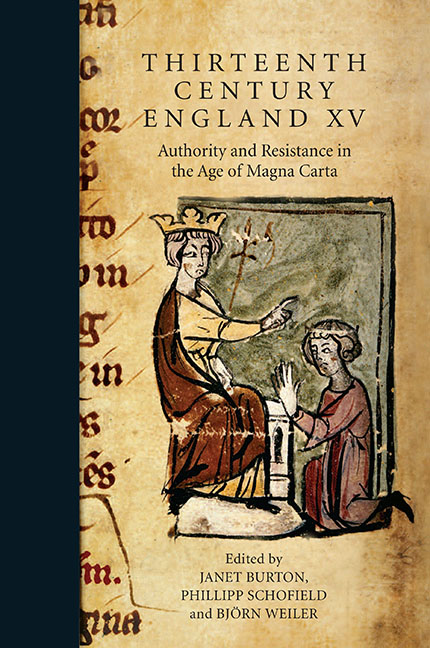 Thirteenth Century England XV
Thirteenth Century England XV Power and the People in Thirteenth-Century England
Published online by Cambridge University Press: 11 June 2021
Summary
The expansion in the capacities of royal, seigniorial and episcopal authority during the thirteenth century did not emanate from a will to power inherent in the psychology of kings, lords or bishops. The institutions of the crown, lordship and the church were not designed and built by Aristotelian legislators creating blueprints for the exercise of power. Power itself did not depend only upon violence; it did not arise from the land; nor did it arise from lineage: at least none of these directly. Violence and arms were commonplace, but relatively few people were able to use them to build up and maintain social and political power. The land did not give up its bounty without labour, and labour was not given away voluntarily. Lineage was not natural superiority, even though it was fabricated to appear that way. Effort was of course required to turn any force or resource into power, and that could not be generated by the powerful themselves, alone.
Power rested upon varying degrees of acquiescence and support. It rested upon relationships. This is not news to any historian, but the nature of those relationships and that acquiescence and support in thirteenth-century England has been surprisingly little examined. The hypothesis to be developed in this paper is that during the course of the thirteenth century the basis of the power exercised by kings, lords and bishops shifted significantly. In 1200 the sinews of power were almost exclusively relationships between men, and occasionally women, who had some mutual personal connection. The archetypal relationship could be said to have been that of vassalage or service. By 1300 these no longer sufficed. The powerful could only maintain their positions by relying upon a huge number of people with whom they had no direct personal connection. This included many of the officers who staffed institutions like the royal exchequer, the honour court or the episcopal chancery, but also several thousand – predominantly peasant – collaborators in villages and parishes across the kingdom. To those in positions of power these new collaborators would have often been anonymous, and en masse alarmingly inscrutable. Relationships with them had to be mediated by a range of formal and informal institutions.
- Type
- Chapter
- Information
- Thirteenth Century England XVAuthority and Resistance in the Age of Magna Carta. Proceedings of the Aberystwyth and Lampeter Conference, 2013, pp. 17 - 34Publisher: Boydell & BrewerPrint publication year: 2015


